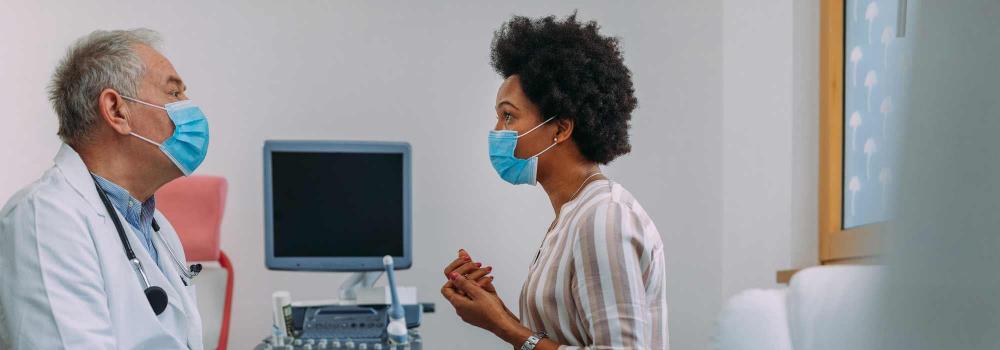As COVID-19 cases begin a new rise and variants become more prevalent, it’s important to bolster support for healthcare staff as much as possible.
Hospitals across the country are full or beginning to fill up. Even if your building isn’t yet, don’t wait — you can prepare your facility and employees for future situations now so that your patients will have the best support possible. Your staff will thank you; Primex solutions can help ease their work burdens during COVID-19 variant caseload increases.
Surveying the Facts About the COVID-19 Variants
Though the world seemed hopeful that the creation and distribution of the COVID-19 vaccines would be substantial enough to put the global pandemic to rest, the emergence of the delta variant signals new challenges for world citizens and healthcare workers. More contagious than the original coronavirus, the delta variant has already threatened millions of people in India (its origination point), Great Britain, and now the U.S. Unvaccinated people are at higher risk (than those who are vaccinated) and are the most susceptible to becoming seriously ill when there are hyperlocal outbreaks, but even vaccinated people are experiencing the effects. Case numbers are smaller in comparison to unvaccinated groups, but infection is still occurring.
On the horizon lurks the lambda variant, which has developed in South America and is spreading across the continent; these variants, coupled with the continued existence of the original virus, pose a significant threat to both the unvaccinated community as well as the staff of healthcare facilities everywhere.
As hospitals admit more and more COVID-19 patients, beds are becoming scarce, people with treatable conditions are becoming unable to receive care, and nurses remain in high demand. One way to prevent more cases is to get people vaccinated; in order to support higher levels of vaccination, vaccines must be properly stored until they can reach their final destination: patients. Additionally, maintaining safe and efficient work environments for healthcare staff and controlled environments for all patients helps keep infectious spread at bay and promote general comfort.
Protecting Staff, Patients, and the Safe Storage of Critical Vaccines
Despite many Americans’ reticence to receive the coronavirus vaccine (47.3% of Americans remain unvaccinated as time of writing), facilities remain prepared to administer vaccines when necessary. Recent FDA approval of the Pfizer COVID-19 vaccine will hopefully lead to greater trust in vaccine safety and efficacy, and subsequently, an influx in willingness to receive it.
Regardless of the number of vaccines already administered, cases are on the rise, and healthcare facilities are either currently dealing with or preparing for another wave of the pandemic. This time, however, there is more opportunity to be prepared, as dedicated scientists have already given us much more of an idea about what we’re up against after learning from the initial outbreaks in 2020. Since then, healthcare scientists and professionals have provided guidance on containing, preventing, and combatting the coronavirus, which include:
- Ensuring Isolation Room Efficacy
Patients with highly contagious diseases commonly require strict isolation to prevent the spread of infection throughout a facility. COVID-19 is no different, and Primex can help — OneVue Sense™ Differential Pressure Sensors ensure COVID-19 patient rooms remain at the right air pressure to contain the virus.
- Monitoring Environmental Conditions
Proper air movement and temperature control can help stifle the spread of infection. OneVue Sense Indoor Air Quality Temperature and Humidity Sensors help to ensure patient care areas remain at a comfortable and safe temperature to limit contagion.
- Providing Temperature-Appropriate Vaccine Storage
Appropriate temperatures are necessary to best preserve the vaccines — OneVue Sense Temperature Sensors are ideal to keep your hospital, health system, clinic, or pharmacy’s vaccine supply stored safely.
The Primex OneVue® web-based software can provide alerts via text message, phone call, or email if storage unit temperature rises above or falls below a specified temperature. This way, staff can ensure they’ll be able to preempt disasters and save valuable vaccine supplies while still staying focused on helping patients. Automated monitoring from Primex sensors — no matter if they’re temperature, ambient air, water leak, or contact closure — can provide proactive alerts to avoid disaster.
It’s important to protect the vaccines and the hospital environment, and it’s also essential to deliver patient care in a timely manner, especially the administration of medications and vaccines. The OneVue Sync™ synchronized time system can assist with on-time medication delivery and treatment for critical patients, as well as making sure vaccine appointments run smoothly and on schedule.
One of the best ways to encourage collaboration between healthcare staff and patients is to strengthen communication; being in the know can help people feel in control when a situation seems uncertain. OneVue Notify® InfoBoard™ displays bolster communication between hospital staff and patients by helping designate patient status with displays exhibiting “ISOLATION” or other such critical messages. They can also help remind staff and patrons about hand hygiene reminders and safety protocols.
Delta variant cases are on the rise, and preparation is the key to controlling the spread. Don't wait until your facility is overwhelmed — prepare your facility and staff now so you can be ready to provide the best care possible.
